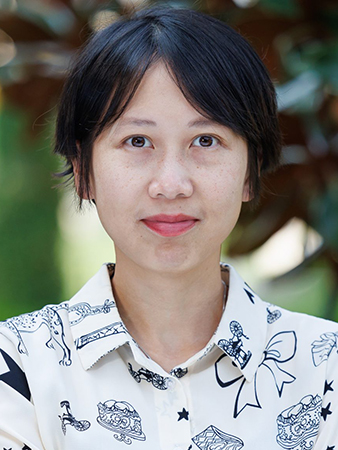How your words shape what you see online

Ongoing research at Mizzou explores the hidden influence of word choice on search results
Contact: Sara Diedrich, diedrichs@missouri.edu
You may have more power than you realize when it comes to shaping the search results you see online.
Ongoing research from the University of Missouri reveals that the search terms users choose can have a significant impact on the results they receive — particularly when it comes to controversial topics. Rather than arbitrarily nudging users toward results with a certain skew or bias, search engines act in response to minute and even unintentional variations in search terms.
“So many people think it’s the algorithm, but that’s not the whole picture,” Chau Tong, an assistant professor of strategic communication at the Missouri School of Journalism and the Institute for Data Science & Informatics, said. “People play a big role in what information they see.”
Tong’s research shows that even subtle biases in search terms can yield vastly different information, which can reinforce existing divides and create echo chambers.
Understanding search engines
Tong’s research centers on the use of computational methods and digital trace analyses to examine different forms of information and communication discrepancies created by digital technology.
Because search engines like Google are so widely used, Tong recognizes their powerful role in shaping public understanding of current events. Her research focuses on how these platforms navigate the challenge of personalizing results for individual users while still presenting a broad range of perspectives. When personalization goes too far, it can create “filter bubbles” — digital echo chambers where users are only exposed to information that reinforces their existing beliefs.
“How people word their searches depends on their existing beliefs,” Tong said. “So that affects how they word their queries. Then, those queries lead them to information that is not neutral.”
Tong said a key implication of her research involves improving access to balanced and diverse information through thoughtful design interventions. This is especially important to ensure that search engines aren’t unfairly influencing political conversations or making it harder for people to see a variety of viewpoints.
“For example, search engines like Google already provide related search suggestions,” she said. “These features could be enhanced to actively encourage users to consider more balanced or alternative search terms — essentially nudging them to explore a wider range of perspectives beyond their initial query.”
Gathering the information
For the study, Tong asked politically active people across the U.S. to use biased search terms — leaning conservative or liberal — during a politically tense time. By doing this, the study aimed to understand how Google’s algorithm responds to biased input and whether it shows different results to different people or reinforces existing political divisions.
“The findings help us learn more about how search engines might influence political opinions, especially in times of deep polarization,” Tong said.
Results show that the biggest factor influencing search results is the wording of the search query. The political beliefs of the users didn’t matter; both liberal- and conservative-leaning search terms would return results that were skewed.
Tong presented her work earlier this year at several conferences for researchers studying artificial intelligence and human-computer interactions. At Mizzou, she directs the Computational Communication and Technology Lab, which uses interdisciplinary insights and data science approaches to examine research questions related to digital information ecosystems, algorithmic recommendations and social outcomes.
Updated: July 15, 2025
